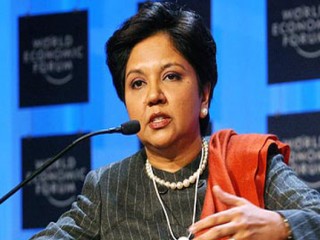
Indra Nooyi biography
Date of birth : 1955-10-28
Date of death : -
Birthplace : Chennai, Tamil Nadu, India
Nationality : Indian
Category : Politics
Last modified : 2011-09-21
Credited as : manager, business executive,
0 votes so far
Nooyi was born in Madras, India, in 1955, into what she described as a conservative family. She led an unusual life for a girl of that time. She loved rock music, and played guitar in an all-girl rock band. She was also an avid cricket player. She earned an undergraduate degree at Madras Christian College, and followed this up with a master's from the Indian Institute of Management in Calcutta. This was one of only two business schools in India at that time, and it was an unusual choice for a woman, who was expected to be more interested in helping her mother around the house. Nooyi got a job with Tootal, a British textile firm, and then worked for the global consumer products company Johnson & Johnson in its Bombay office. Nooyi took on a very difficult assignment, becoming Johnson & Johnson's area product manager for its Stayfree brand sanitary pads. At that time, not only could such a product not be advertised in India, but many retailers shied away from stocking sanitary pads. Nooyi did her marketing directly, traveling to schools and colleges to educate female consumers and introduce them to the Johnson & Johnson line.
While she enjoyed her work at Johnson & Johnson, Nooyi nursed an ambition to study in the United States. She saw a magazine advertisement for Yale University's School of Management, which was then a new program. She liked the fact that its dean was not an academic but had an industry background. Without many expectations, she applied. She was surprised to be accepted, and to get financial aid, but she was even more surprised that her parents let her go. She told Sarah Murray of the Financial Times, "It was unheard of for a good, conservative, south Indian Brahmin girl to do this. It would make her an absolutely unmarriageable commodity after that." Nevertheless, Nooyi went, beginning her management courses in 1978.
Despite her scholarship, Nooyi had little money and she had to work in the evenings. When she first applied for summer jobs, she had no business suit, and could not afford to buy one. So she blithely attended her interviews in a sari. Her unusual style did not seem to hold her back. Nooyi noted that by the end of her first summer job, she could afford two suits. After she graduated, Nooyi went to work for the Boston Consulting Group, and stayed with that firm for six years. In 1986 she joined the electronics firm Motorola, where she worked on strategic planning. In 1990 she took a job as a top manager at the Connecticut engineering firm Asea Brown Boveri.
In 1994, Nooyi was looking for a new job, and she landed two highly desireable offers. One was at General Electric, and the other was with Pepsico. She told Pepsico's then-CEO Wayne Calloway that she was having trouble deciding. He told her he thought General Electric was a great company, but on the other hand, he really needed her at Pepsico, and he would make it a special place for her. So Nooyi signed on, becoming Pepsico's chief strategist. She was involved in the very highest level of planning for the company's future. Pepsico had long dogged rival Coca-Cola, but had evolved into a complicated business that reached beyond its flagship Pepsi drink. Nooyi spent months reviewing the economics of different parts of the Pepsico empire. She came to a surprising decision, which was that the company should shed its restaurant division. Pepsico owned the fast food chains Pizza Hut, KFC, and Taco Bell. Pepsico's CEO wanted to hold onto the division, but Nooyi insisted that the company would be better off without it. Finally, in 1997, she got her way. She then led the company to get rid of its bottling division, fearing it was a drag on Pepsico's stock market valuation. Her next moves were the acquisition of the juice maker Tropicana and of the breakfast cereal and snack maker Quaker Oats.
The changes Nooyi made at Pepsico transformed the company. Nooyi became Pepsico's chief financial officer in 2000, and over the next year, the company's stock price rose almost 30 percent. Revenue increased about eight percent, and earnings went up by 13 percent. Pepsico now had a strong grouping of well-known snack food and drink brands, with its addition of Quaker Oats and Tropicana. "For any part of the day we will have a little snack for you," boasted Nooyi to BusinessWeek. The company had long done well in suburban markets. It now hoped to grow in urban areas, which required a different marketing strategy. For this, Nooyi had to work closely with chief operating officer Steve Reinemund. Reinemund became chief executive of Pepsico in 2001, and he promoted Nooyi to president. It was very important to Reinemund, a former Marine and apparently the quintessential buttoned-down businessman, to have Nooyi's more spontaneous personality and great analytical skills to balance his own insight into the future of the company. The two admittedly made an odd pair, characterized by BusinessWeek as "one of the most unusual management teams in Corporate America." But their opposite strengths seemed to do well for the company. Nooyi is seven years younger than Reinemund, and seems poised to become chief executive of Pepsico at some point down the road.
















